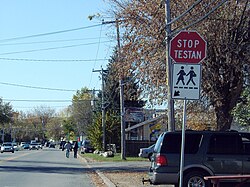Top Qs
Timeline
Chat
Perspective
Mohawks of Kahnawà:ke
First Nation in Canada From Wikipedia, the free encyclopedia
Remove ads
Mohawks of Kahnawà:ke (Mohawk: Kahnawákeró:non)[1] are a Mohawk First Nation located in Mohawk Nation Territory composing part of Quebec, Canada. In 2024 the band had a registered population of 11,787 members. Its main reserve is Kahnawake 14, located on the south shore of the St. Lawrence River opposite Montreal. It also shares the uninhabited reserve of Doncaster 17 with the Mohawks of Kanesatake for hunting and fishing. The band is governed by the Mohawk Council of Kahnawà:ke.

Remove ads
Demographics
The members of Kahnawà:ke First Nation are Mohawk who left the Mohawk Valley in the 1660s to return to the Northern part of Mohawk Nation territory. However, they may have been predominately assimilated captives of the Beaver Wars from the Huron and Algonquin tribes.[2] In November 2024, the band had a total registered population of 11,787 members, 3,635 of whom lived off reserve.[3][4]
Geography

The band of Kahnawà:ke lives primarily on a reserve, Kahnawake 14, located 8 km southwest of Montreal, Quebec. This reserve covers an area of 4,825 ha.[5] The band also shares an uninhabited reserve, Doncaster 17, located 16 km northeast of Sainte-Agathe-des-Monts with the Mohawks of Kanesatake for hunting and fishing.[6] The First Nation is headquartered at Kahnawake. The closest major city is Montreal.[7]
Remove ads
Governance
Summarize
Perspective

The Mohawk of Kahnawà:ke are governed by a band council, called Mohawk Council of Kahnawà:ke. Members are elected to three-year terms according to a custom electoral system based on Section 11 of the Indian Act.
Current council
Appointed in July 2024, for a term lasting until June 2027, the current chief and council are:
- Grand Chief: Cody Diabo
- Arnold Boyer
- Iohahai:io Delisle
- David A. Diabo
- Jeffrey Diabo
- Jeremiah Johnson
- Stephen A. McComber
- Ross Montour
- Ryan Montour
- Melanie Morrison
- Tonya Perron
- Paul Rice[8]
Electoral history
2018
The 2018 elections were held on Saturday, 7 July (Ohiarihkó:wa).[9]
2015
The 2015 elections were held on Saturday, 20 June (Ohiarí:ha).[10]
2012
The 2012 elections were held on Saturday, 7 July (Ohiarihkó:wa).[11]
2009
The 2009 elections were held on Saturday, 4 July at Kateri School.[12]
2006
The 2006 elections were held on Saturday, 1 July (Ohiari'kó:wa).[13]
Remove ads
See also
References
External links
Wikiwand - on
Seamless Wikipedia browsing. On steroids.
Remove ads

